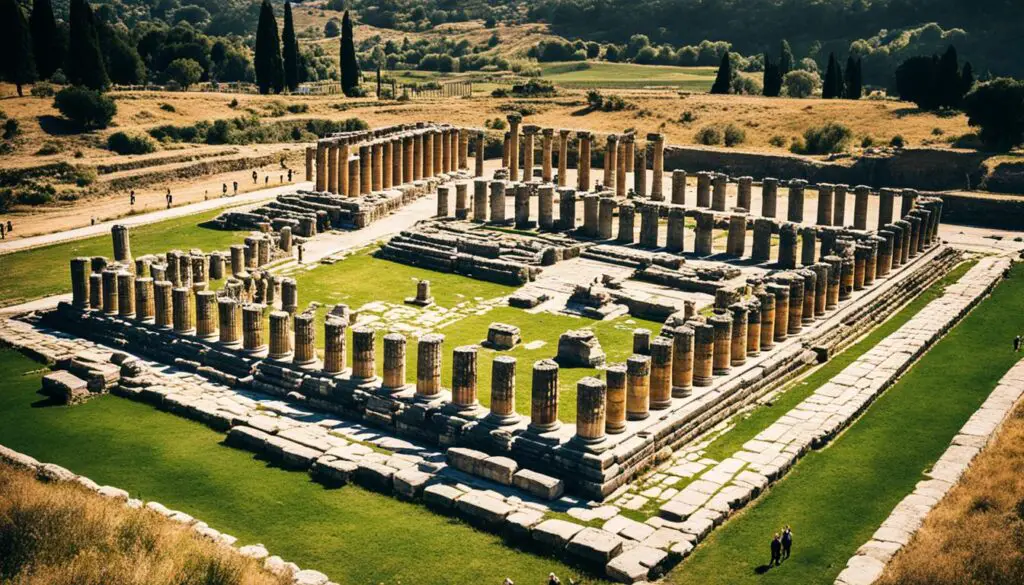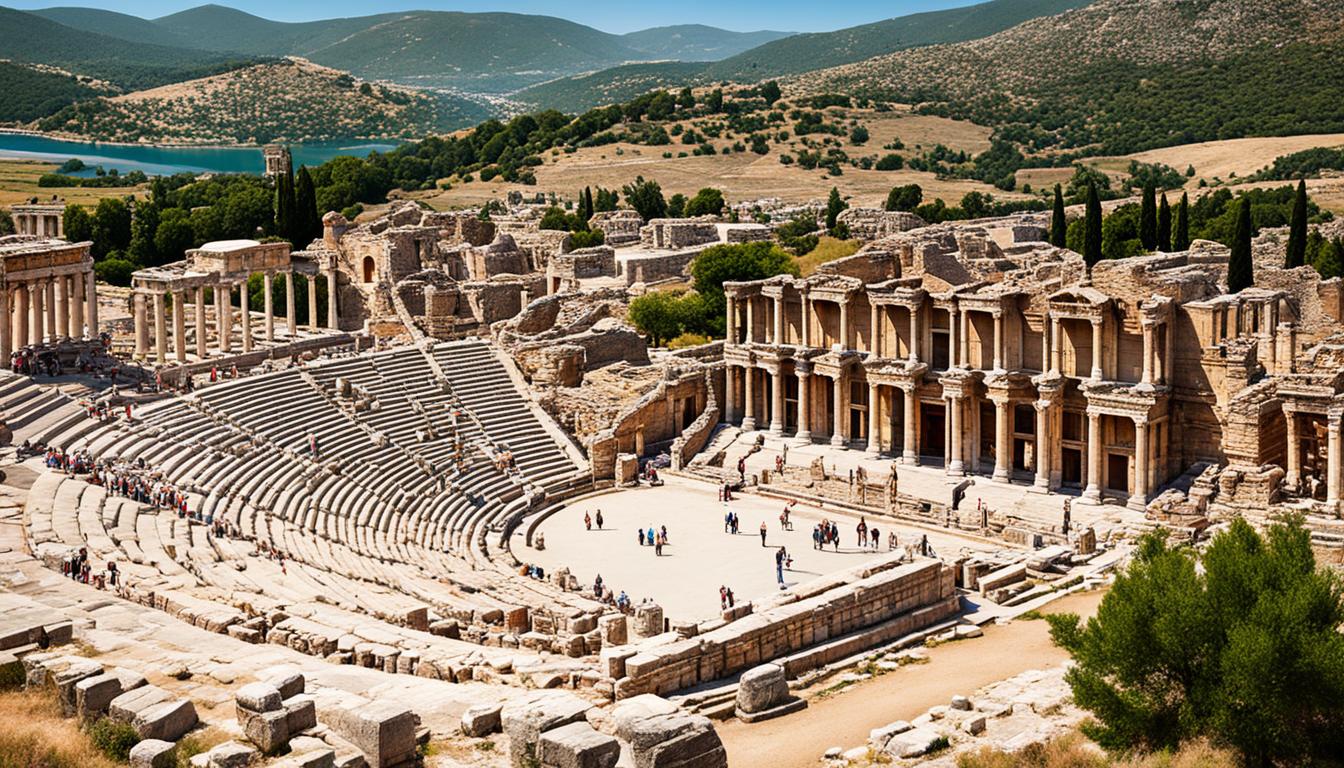Ephesus, an ancient city of great historical significance, holds a prominent place in the Bible. As the capital city of a Roman province in Asia, Ephesus was a bustling center of trade and boasted remarkable architectural wonders. It is particularly renowned for its magnificent temple of Artemis, one of the Seven Wonders of the Ancient World. However, Ephesus’s biblical role goes beyond its physical grandeur.
Ephesus is mentioned multiple times in the Bible, notably in the New Testament. One of the key figures associated with Ephesus is the Apostle Paul, who spent a significant amount of time in the city. Paul played a crucial role in evangelizing the region and establishing a vibrant Christian community in Ephesus.
The biblical book of Ephesians, believed to be a letter from Paul to the Ephesian Christians, provides valuable insights into the theological teachings and ethical exhortations relevant to the early church in Ephesus.
Key Takeaways:
- Ephesus was an ancient city with a rich historical significance.
- Apostle Paul played a vital role in the spread of Christianity in Ephesus.
- The biblical book of Ephesians addresses important theological themes relevant to the early church in Ephesus.
- Ephesus is renowned for its archaeological site, which preserves the ruins of the ancient city.
- Exploring Ephesus in the Bible provides valuable insights into the development of early Christianity and its impact on the ancient world.
Historical Significance of Ephesus
Ephesus, the capital city of a Roman province in Asia, holds immense historical significance. Its role as a thriving center of trade and commerce, along with its impressive architecture and monuments, cemented its place in the ancient world. People from far and wide were attracted to this magnificent ancient city, which boasted grand temples, theaters, and an extravagant library.
One of the most famous structures in Ephesus was the Temple of Artemis, considered one of the Seven Wonders of the Ancient World. This monumental temple served as a hub for religious rituals and was a symbol of the city’s cultural and religious practices.
The archaeological site of Ephesus, located near the western shores of modern-day Turkey, now preserves the remains of this once vibrant and influential city. Excavations have unearthed a wealth of artifacts and ruins, offering valuable insights into the daily lives, traditions, and achievements of the ancient Ephesians.
This image showcases a glimpse of the remarkable ruins found within the archaeological site of Ephesus.
Geographical Location of Ephesus
Ephesus, an ancient city of great historical and cultural significance, is located near the western shores of modern-day Turkey. Situated at the intersection of the Aegean Sea and the former estuary of the River Kaystros, Ephesus enjoyed a strategic geographical location that contributed to its prominence in trade and commerce.
About 80 kilometers south of Izmir, Turkey, Ephesus was ideally positioned near a harbor and major roads connecting it to other significant cities in Asia Minor. This advantageous location facilitated the flow of goods, attracting merchants and visitors from far and wide. The city thrived as a hub of economic activity, benefiting from its proximity to key transportation routes.
“The geographical location of Ephesus played a crucial role in its rise as a prominent ancient city.”

Aegean Sea and River Kaystros: Confluence of Beauty and Commerce
The meeting point of the Aegean Sea and the River Kaystros added to the allure of Ephesus. The city boasted a picturesque coastal setting, allowing for breathtaking views and a pleasant climate. It attracted visitors not only for its economic opportunities but also for its natural beauty.
“The confluence of the Aegean Sea and River Kaystros created a stunning backdrop for the magnificent city of Ephesus.”
| Key Features | Benefits |
|---|---|
| Access to the Sea | Ephesus had a harbor that facilitated maritime trade and transportation. |
| Connectivity | The city’s location near major roads allowed for easy access to other significant cities in Asia Minor. |
| Natural Beauty | Ephesus offered stunning coastal views and a pleasant climate, attracting visitors. |
“The geographical advantages of Ephesus contributed to its economic prosperity, cultural exchange, and overall significance in ancient times.”
Archaeological Discoveries in Ephesus
The archaeological site of Ephesus has been a treasure trove of significant discoveries, providing invaluable insights into the ancient city’s architecture, lifestyle, and cultural practices. Excavations have revealed well-preserved ruins of buildings, showcasing the grandeur of Ephesus in its prime.
The Impressive Amphitheater
One notable archaeological find in Ephesus is its magnificent amphitheater. With a seating capacity of over 24,000, it was one of the largest amphitheaters in the ancient world. This grand structure served as a venue for various events, including gladiatorial contests, theatrical performances, and religious ceremonies.
The Library of Celsus
Another remarkable discovery in Ephesus is the Library of Celsus, an iconic structure that housed thousands of scrolls and served as a symbol of knowledge and learning. Its stunning facade, adorned with intricate carvings and statues, stands as a testament to the city’s intellectual and cultural significance.
The Temple of Artemis
Ephesus was also home to the famous Temple of Artemis, one of the Seven Wonders of the Ancient World. Although the temple itself no longer stands, archaeological excavations have revealed its foundations and fragments, giving us a glimpse into the splendor and devotion associated with this sacred site.
These archaeological discoveries in Ephesus paint a vivid picture of the city’s past, allowing us to appreciate its architectural achievements, cultural heritage, and the daily lives of its inhabitants. Exploring these ruins offers a tangible connection to the past and a deeper understanding of Ephesus’s historical and cultural significance.
Theological Themes in Ephesus
Ephesus holds great theological significance in the Bible. It is mentioned multiple times in the New Testament, emphasizing its importance in early Christianity. One of the key biblical books associated with Ephesus is Ephesians, which delves into essential theological themes.
“For He Himself is our peace, who has made the two groups one and has destroyed the barrier, the dividing wall of hostility.” – Ephesians 2:14.
The letter to the Ephesians highlights the unity of believers, emphasizing that through faith in Christ, all barriers of hostility are broken down. The book addresses the role of the church in promoting harmony and spiritual growth among believers. It emphasizes the importance of love, forgiveness, and the spiritual armor necessary to withstand challenges.
- Unity of Believers: Ephesians stresses the unity that Christians share in Christ, highlighting the breaking down of divisions and reconciliation among diverse individuals (Ephesians 2:11-22).
- Salvation through Faith: The letter emphasizes that salvation is a gift from God, received through faith in Jesus Christ (Ephesians 2:8-9).
- Role of the Church: Ephesians underscores the purpose and responsibilities of the church in promoting unity, spiritual maturity, and the proclamation of the gospel (Ephesians 4:11-16).
- Spiritual Growth: The book encourages believers to grow in their understanding of God’s love, expressing it in their relationships and daily lives (Ephesians 3:14-21).
Ephesus provides a significant backdrop for these theological teachings, as it was a city immersed in diverse cultures, religious practices, and challenges to the Christian faith. The theological themes addressed in Ephesians reflect the spiritual needs and struggles faced by the early Christian community in Ephesus.
The Unity of Believers
Ephesians 2:14 highlights the concept of unity and reconciliation among believers. It illustrates that through Christ, the barriers of hostility between different societal groups are dismantled, allowing for a united community bound by love and faith.

Key Biblical Events in Ephesus
Several key biblical events took place in Ephesus, making it a significant location in the New Testament. The apostle Paul played a crucial role in the city, spending a significant amount of time preaching and establishing a church. Through his ministry, Paul performed miracles such as healings and exorcisms, demonstrating the power of God in Ephesus. His presence and teachings left a lasting impact on the early Christian community.
Paul’s letter to the Ephesians provides valuable insights into the spiritual journey and challenges faced by the believers in Ephesus. The epistle emphasizes the unity of believers, the importance of salvation through faith in Christ, and the role of the church in nurturing the faith of its members. It serves as a theological guide and encouragement to the early Christians who called Ephesus home.
“For we are God’s handiwork, created in Christ Jesus to do good works, which God prepared in advance for us to do.” – Ephesians 2:10
Additionally, the Book of Revelation includes a letter specifically addressed to the church in Ephesus. Within this letter, the strengths of the Ephesian church are commended, but they are also admonished to return to their first love and renew their commitment to Christ. The letter demonstrates the importance of staying faithful and dedicated to one’s faith in the face of challenges and distractions.

Key Biblical Events in Ephesus:
- Paul’s ministry and establishment of the church in Ephesus
- Miracles performed through Paul’s ministry, including healings and exorcisms
- Insights into the early Christian community through Paul’s letter to the Ephesians
- The letter from the Book of Revelation addressed to the church in Ephesus
Ephesus was not only a physical city but also a spiritual battleground, where the message of the Gospel clashed with opposing forces. However, the enduring impact of these key biblical events continues to inspire and guide believers today.
Cultural and Religious Practices in Ephesus
Ephesus, an ancient city with a rich cultural and religious heritage, was renowned for its diverse practices and beliefs. The city was particularly known for its devotion to the goddess Artemis, whose temple served as a prominent center of religious activity. Worshipers from far and wide flocked to Ephesus to pay their respects and seek blessings from Artemis.
The cultural significance of Ephesus extended beyond its religious practices. As a major trading hub, the city attracted people from various cultures and backgrounds. The convergence of different traditions and customs in Ephesus created a vibrant melting pot of ideas and beliefs.
This cultural diversity played a significant role in shaping the early Christian community in Ephesus. The presence of people with diverse religious backgrounds posed unique challenges for the spread of Christianity. The followers of Jesus had to navigate through cultural barriers and find ways to effectively communicate their beliefs in a religiously pluralistic society.
“For we are God’s handiwork, created in Christ Jesus to do good works, which God prepared in advance for us to do.” (Ephesians 2:10)
The cultural and religious practices in Ephesus shaped the context in which the early church thrived. The believers in Ephesus had to navigate the tensions between their newfound faith in Christ and the cultural expectations and practices of the city. They persevered, standing firm in their beliefs and becoming a testament to the transformative power of the gospel.
The presence of Ephesus in the New Testament attests to its significance in the early Christian movement. The challenges faced by the early believers in Ephesus highlight the dynamic interplay between cultural practices and religious convictions. It serves as a reminder that faith is not immune to the complexities of the human experience, but rather, it thrives amidst diversity and challenges.

Prophetic and Eschatological Significance of Ephesus
Ephesus holds a unique place in early Christianity, with both prophetic and eschatological significance. In the biblical book of Revelation, a letter is addressed to the church in Ephesus. This letter admonishes the Ephesian Christians to repent and return to their first love, warning of the consequences if they fail to do so. This prophetic message underscores the importance of Ephesus in the spiritual journey and end-time context.
“Yet I hold this against you: You have forsaken the love you had at first. Consider how far you have fallen! Repent and do the things you did at first. If you do not repent, I will come to you and remove your lampstand from its place” (Revelation 2:4-5).
The message to the church in Ephesus serves as a reminder of the importance of maintaining a fervent love for God and a commitment to His teachings. It emphasizes the need for repentance and spiritual renewal in order to remain faithful to the calling of Christ.
This prophetic significance of Ephesus is further supported by other biblical prophecies and teachings that highlight the role of this ancient city in the grand narrative of God’s plan for humanity. Ephesus, as a symbol of the early Christian community, serves as a backdrop for eschatological themes, shedding light on the end-time events and the ultimate fulfillment of God’s promises.

In exploring the prophetic and eschatological significance of Ephesus, we gain a deeper understanding of the spiritual journey of early Christians and the relevance of their experiences to our own faith today. Ephesus challenges us to examine our relationship with God, encouraging us to return to our first love and remain steadfast in the face of challenges and trials.
Ephesus Church History
The history of the church in Ephesus is deeply intertwined with the apostle Paul and the early spread of Christianity. From its establishment by Paul to its prominence as a center of early Christian activity, the Ephesian church played a critical role in the growth of the gospel message.
The church in Ephesus faced various challenges throughout its history, but it remained steadfast in its commitment to the teachings of Jesus Christ. As the city was a cultural and religious melting pot, the early Christian community in Ephesus had to navigate the diverse practices and beliefs of its inhabitants. Despite these challenges, the church thrived and became a shining light in the ancient city.
The Ephesian church history provides valuable insights into the struggles and triumphs of the early Christian community. It showcases the dedication and perseverance of the believers in sharing their faith and living out the teachings of Christ amidst a sometimes hostile environment.
“For our struggle is not against flesh and blood, but against the rulers, against the authorities, against the powers of this dark world and against the spiritual forces of evil in the heavenly realms.” – Ephesians 6:12
The biblical book of Ephesians, believed to be a letter from Paul, addresses important theological themes and provides guidance for the Ephesian Christians. It emphasizes the unity of believers, the significance of salvation through faith in Christ, and the role of the church in spreading the gospel.
The Ephesian church history serves as a reminder of the enduring power of faith and the impact of individuals and communities dedicated to living out the teachings of Jesus. It is a testament to the triumph of the early church and a source of inspiration for believers today.
Conclusion
In conclusion, Ephesus stands as an extraordinary testament to the rich tapestry of history, religion, and culture that shaped the ancient world. From its prominence as the capital city of a Roman province to its vital role in the early spread of Christianity, Ephesus has left an indelible mark on our understanding of the past.
The ruins of Ephesus, with their awe-inspiring architecture and well-preserved artifacts, offer a window into the city’s glorious past. Scholars and historians can delve into the past and piece together the vibrant history of Ephesus, while visitors can immerse themselves in the ancient streets and buildings, connecting with the people and events that once thrived in this remarkable place.
For believers, Ephesus holds a unique place of reverence. The biblical references to Ephesus and the theological teachings embedded in the letters written to the Ephesian church continue to inspire and guide countless individuals in their faith journeys. Ephesus remains an enduring symbol of the transformative power of the Gospel and a reminder of the profound impact that early Christians had on the world.
As we explore the ruins and delve into the historical and biblical narratives of Ephesus, let us marvel at the wonders of this ancient city and cherish the legacy it has left behind. Ephesus beckons us to discover, learn, and embrace the lessons of the past, enabling us to cultivate a deeper appreciation for the interplay between history, faith, and humanity.







